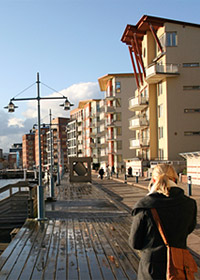ABOUT
Goteborg Energi, Sweden


Company
Göteborg Energi is the municipal electric utility in Göteborg, the second largest city in Sweden with a population of half a million. As Western Sweden's leading energy company, its activities span distribution and sales of electricity, district heating, cooling, gas, optical fibre broadband networks and energy services. With 265,000 electricity distribution customers, Göteborg Energi ranks as the fourth largest DSO in Sweden.
Göteborg Energi owns the 8,000 km electricity distribution network most of which is buried underground, and protected from wind and weather. The distribution operation involves connecting customers to the electricity network and distributing electricity to households, offices and industries.
Situation
In 2007 Sweden passed a national law that required electricity distributors to bill customers to an actual read on a monthly basis. As a result of the new law, 5.5 million meters had to be replaced across the country.
Goteborg Energi AB faced a major challenge in identifying and replacing an existing metering system with the best possible advanced metering infrastructure (AMI) system available from a supplier. The supplier had to have a proven track record and had to be trusted to deliver by 2009. In addition, a significant financial investment to transition to a more streamlined and modern electric metering system was required. But more importantly, a corollary challenge was how to sustain on-going costs and try to retrieve the initial investment.
"To comply with the law, we had two choices. Either to go as low cost as possible and limit our capital expenses to a minimum. Or get extra revenue from services we didn't have before to offset investment and operational costs. The decision from our steering group was very clear — get the best possible system and setup a new business unit to try to create new services. That decision then became the foundation for the project."
— Tomas Arnewid, AMI project manager, Goteborg Energi
Göteborg Energi set high expectations for its new smart metering system. They envisioned saving millions of euros by eliminating manual meter reads and being able to bill the actual usage to its customers. Besides collecting hourly meter values, the system would be capable of monitoring the quality of supply, detecting energy theft and power outages, and analyzing energy consumption for individual customers or areas. The utility also believed that there is a large potential market for external services using its new network infrastructure. As an environmentally-conscious public utility, the new AMI network infrastructure will also help it deliver sustainable energy services while reducing the impact of its operations on the environment.
As part of selecting a new system, Goteborg Energi evaluated three different technologies. Power line communication offered low investment, but high operational cost. At the service level, it was slow and had missing values. As far as adding new services, power line communication was a difficult proposition. GSM communication incurred a high investment and high operational cost. But it was fast, yet had missing values in the service category. It was possible to add services, however, the incurred expense would be high. The last option, radio communication, provided Goteborg Energi the desirable cost/performance traits together with the capability to easily add new services in the long run. Once that was decided, the focus became increasingly on the system itself, and not solely on communications.
Göteborg Energi selected Nuri Telecom and Embirq, a leading Norwegian IT and AMI system integration company to supply ZigBee compliant Advanced Metering Management (AMM) System for its 265,000 homes. This makes Goteborg Energi the world's first company to cover a whole city with a wireless ZigBee infrastructure for the metering services of tomorrow.
